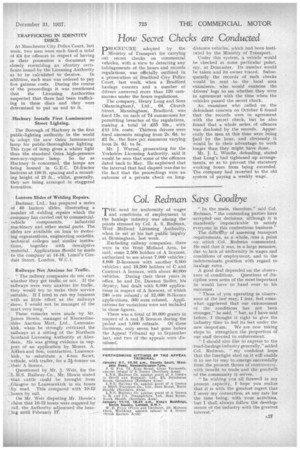How Secret Checks are Conducted
Page 7

If you've noticed an error in this article please click here to report it so we can fix it.
PROCEDURE adopted by the Ministry of Transport for carrying out secret checks on commercial vehicles, with a view to detecting any infringements of the hours and records regulations, was officially outlined in a prosecution at Bradford City Police Court, last week, when a Bradford haulage concern and a number of drivers answered more than 120 summonses under the hours regulations.
The company, Henry Long and Sons (Manningham), Ltd., 64, Church Street, Manningham, Bradford, was fined 15s. on each of 74 summonses for permitting breaches of the regulations, making a total 'of £55 10s., with £15 15s. costs. Thirteen drivers were fined amounts ranging from 2s. 6d. to Ss., the fines per summons varying from 2s. 6d. to 5s.
Mr. J. Wurzal, prosecuting for the Yorkshire Licensing Authority, said it would be seen that some of the offences dated back to May. He explained that the interval that had elapsed was due to the fact that the proceedings were an outcome of a private check on long distance vehicles, which had been instituted by the Ministry of Transport.
Under this system, a vehicle would be checked at some particular point, say, at Doncaster. Its number would be taken and its owner traced. Subsequently the records of such checks would be sent to the local area examiners, who would examine the drivers' logs to see whether they were in agreement with the time when the vehicles passed the secret check.
An examiner who called on the defendant concern on October 6 found that the records were in agreement with the secret check, but he also found that a whole series of offences was disclosed by the records. Apparently the men at this time were being 'paid by the hour, and obviously it would be to their advantage to work longer than they might have done.
Mr. J. L. Windle, defending, stated that Long's had tightened up arrangements, so as to prevent the statutory working hours from being exceeded. The company had reverted to the old system of paying a weekly wage.
































